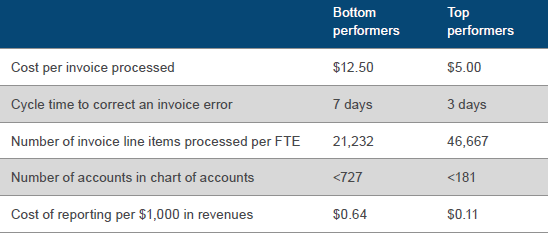Automating business processes in accounting and finance represents an enormous opportunity for business leaders. It’s a chance for chief financial officers (CFOs) to excel at their traditional role — improving operations and reducing costs — while leveraging their experience with automation to become central to digital business process transformation initiatives throughout their companies.
According to the American Productivity and Quality Center (APQC), nearly 3 in 4 organizations have an active financial process transformation project underway. Embracing this change creates long-term benefits for both the CFO and the company. It can position the CFO as a powerful force in the broader corporate objective of digital transformation and business process transformation.
The following data from APQC’s Blueprint for Success and Sustainable Process Transformation in Finance and Accounting shows there are significant differences between top-tier companies and their less successful counterparts.

These variations — which are often caused by non-standardized, ad hoc, manual accounting processes that are reliant on paper — create a cost disadvantage for companies that fail to adopt document management-driven financial process automation.
.gif)
FEATURED SOLUTION
Invoice processing made easy
Discover how DocuWare can optimize your accounts payable workflows in just a few steps.
Automating these 4 accounting processes is a top priority
1. Accounts payable
 Automated accounting leverages software to complete important finance operations. This software automates repetitive tasks, such as data entry and checking calculations, allowing accountants to focus on bigger priorities.
Automated accounting leverages software to complete important finance operations. This software automates repetitive tasks, such as data entry and checking calculations, allowing accountants to focus on bigger priorities.According to APQC, there are a wide variety of efficiencies to be gained by automating invoice process management. Consider how top organizations perform relative to those on the bottom and the day in and day out impact this has on overall business efficiency, costs, and productivity.
Here’s why manual and paper-based processes are so damaging. Any level of invoice management efficiency is difficult to achieve when you’re routing paper invoices. It’s common for a paper invoice to sit in an approver’s inbox for a week, or go missing altogether, resulting in additional employee hours spent chasing it down as well as the likelihood of missing out on early payment discounts.
.jpg?width=240&name=iStock-840519184%20(3).jpg) With the digital workflow, available through a document management system (DMS), however, documents move through your organization as efficiently as possible. Then your team is automatically alerted to correct errors or seek out additional information rather than waiting until they have to fix mistakes. Instant flagging of non-standard invoices, flexible routing to the correct decision makers, and easy annotations and notes are critical to automating the exception process.
With the digital workflow, available through a document management system (DMS), however, documents move through your organization as efficiently as possible. Then your team is automatically alerted to correct errors or seek out additional information rather than waiting until they have to fix mistakes. Instant flagging of non-standard invoices, flexible routing to the correct decision makers, and easy annotations and notes are critical to automating the exception process.
.jpg?width=240&name=iStock-840519184%20(3).jpg) With the digital workflow, available through a document management system (DMS), however, documents move through your organization as efficiently as possible. Then your team is automatically alerted to correct errors or seek out additional information rather than waiting until they have to fix mistakes. Instant flagging of non-standard invoices, flexible routing to the correct decision makers, and easy annotations and notes are critical to automating the exception process.
With the digital workflow, available through a document management system (DMS), however, documents move through your organization as efficiently as possible. Then your team is automatically alerted to correct errors or seek out additional information rather than waiting until they have to fix mistakes. Instant flagging of non-standard invoices, flexible routing to the correct decision makers, and easy annotations and notes are critical to automating the exception process.2. Audit documentation
 Everyone, especially the finance department, loves the annual audit. Not.
Everyone, especially the finance department, loves the annual audit. Not.If you have a paper-based system, an audit is often an ordeal for the accounting department and the auditor. Think about the time accounting staff waste digging through paper files that may not even be stored onsite. And that’s before the audit even begins. If your paper files are incomplete or disorganized, your audit could be drawn out and stressful.
If you eliminate cumbersome paper-based processes and replace them with secure digital documents, your team will be more prepared because they have everything they need at their fingertips. It’s important to be able to see who accessed what accounting documents -- and when. That’s especially true for publicly traded companies. To comply with the Sarbanes-Oxley Act, companies need a highly detailed audit trail that’s only made possible with a DMS. With digitization, your staff can respond quickly to auditor requests and maintain greater control over business information.
3. Procurement and purchasing
 Procurement includes the processes by which business requirements are translated into supplier requirements; the management of supplier relationships; and ultimately the ordering of goods and services needed to produce a product or provide a service. Procurement teams can drown in masses of documents and paperwork, incompatible files, formats, and systems. Converting the paperwork from a physical format to a digital one is a critical first step to process improvement.
Procurement includes the processes by which business requirements are translated into supplier requirements; the management of supplier relationships; and ultimately the ordering of goods and services needed to produce a product or provide a service. Procurement teams can drown in masses of documents and paperwork, incompatible files, formats, and systems. Converting the paperwork from a physical format to a digital one is a critical first step to process improvement. 4. Month-end close
.jpg?width=220&name=iStock-495695706%20(1).jpg) Once the core processes outlined above have been automated, companies should focus on incorporating these improvements into a department-wide effort to streamline the monthly close process. This frees up time for strategic thinking. The finance team can better understand the implications of the data they are reporting on rather than just the figures themselves.
Once the core processes outlined above have been automated, companies should focus on incorporating these improvements into a department-wide effort to streamline the monthly close process. This frees up time for strategic thinking. The finance team can better understand the implications of the data they are reporting on rather than just the figures themselves.According to the Association of International Certified Professional Accountants (AICPA), “Speed and accuracy are a constant challenge for those involved in the month-end close process. Many organizations are seeking information at an accelerated pace. But they also need to be able to trust the data they’re acting on."
There's lots of room for the improvement and increased security brought about by digitizing this as shown in the results of a survey by software provider Adra Match, just 28% of respondents said they trust the numbers reported in the month-end close. At the same time, 90% said they are under pressure to close faster. Meanwhile, just 39% said they are satisfied with the quality of the closing process.
Get ready to make the leap
Your document management solution should integrate easily with whatever financial, accounting, and ERP systems runs the financial operations in your company. A document management decision is not just a question of how and where electronic documents are stored; your objective is to automate business processes. These processes – and a host of others both within finance and tied to accounting processes – overlap. So, beware of point solutions that resolve a single issue, but leave you exposed to greater risk across departments.
.jpg?width=245&name=iStock-481074248%20(1).jpg) Don’t get caught up in analysis paralysis. It’s clear that getting rid of paper and process automation have considerable benefits for your business, your customers and your bottom line. You can expedite your accounting department’s digital transformation with DocuWare for Invoice Processing which is preconfigured and cloud-based. To create this solution, DocuWare packaged the key requirements and decision points that most companies share. Then these common denominators were integrated into easy to implement digital workflows. This turnkey solution can be up and running in just a few days.
Don’t get caught up in analysis paralysis. It’s clear that getting rid of paper and process automation have considerable benefits for your business, your customers and your bottom line. You can expedite your accounting department’s digital transformation with DocuWare for Invoice Processing which is preconfigured and cloud-based. To create this solution, DocuWare packaged the key requirements and decision points that most companies share. Then these common denominators were integrated into easy to implement digital workflows. This turnkey solution can be up and running in just a few days.Editor's note: this blog post has been updated and additional content has been added.
Main image by: Joshua Coleman on Unsplash



